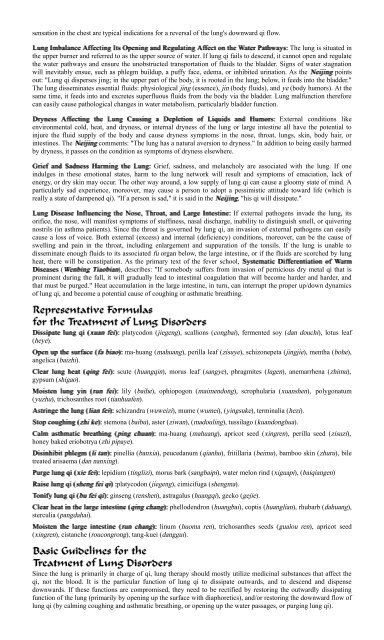Create successful ePaper yourself
Turn your PDF publications into a flip-book with our unique Google optimized e-Paper software.
sensation in the chest are typical indications for a reversal of the lung's downward qi flow.<br />
Lung Imballance Affecttiing Itts Openiing and Regullattiing Affectt on tthe Watter Patthways:: The lung is situated in<br />
the upper burner and referred to as the upper source of water. If lung qi fails to descend, it cannot open and regulate<br />
the water pathways and ensure the unobstructed transportation of fluids to the bladder. Signs of water stagnation<br />
will inevitably ensue, such as phlegm buildup, a puffy face, edema, or inhibited urination. As the Neiijjiing points<br />
out: "Lung qi disperses jing; in the upper part of the body, it is rooted in the lung; below, it feeds into the bladder."<br />
The lung disseminates essential fluids: physiological jing (essence), jin (body fluids), and ye (body humors). At the<br />
same time, it feeds into and excretes superfluous fluids from the body via the bladder. Lung malfunction therefore<br />
can easily cause pathological changes in water metabolism, particularly bladder function.<br />
Dryness Affecttiing tthe Lung Causiing a Depllettiion of Liiquiids and Humors:: External conditions like<br />
environmental cold, heat, and dryness, or internal dryness of the lung or large intestine all have the potential to<br />
injure the fluid supply of the body and cause dryness symptoms in the nose, throat, lungs, skin, body hair, or<br />
intestines. The Neiijjiing comments: "The lung has a natural aversion to dryness." In addition to being easily harmed<br />
by dryness, it passes on the condition as symptoms of dryness elsewhere.<br />
Griief and Sadness Harmiing tthe Lung:: Grief, sadness, and melancholy are associated with the lung. If one<br />
indulges in these emotional states, harm to the lung network will result and symptoms of emaciation, lack of<br />
energy, or dry skin may occur. The other way around, a low supply of lung qi can cause a gloomy state of mind. A<br />
particularly sad experience, moreover, may cause a person to adopt a pessimistic attitude toward life (which is<br />
really a state of dampened qi). "If a person is sad," it is said in the Neiijjiing, "his qi will dissipate."<br />
Lung Diisease Inflluenciing tthe Nose,, Throatt,, and Large Inttesttiine:: If external pathogens invade the lung, its<br />
orifice, the nose, will manifest symptoms of stuffiness, nasal discharge, inability to distinguish smell, or quivering<br />
nostrils (in asthma patients). Since the throat is governed by lung qi, an invasion of external pathogens can easily<br />
cause a loss of voice. Both external (excess) and internal (deficiency) conditions, moreover, can be the cause of<br />
swelling and pain in the throat, including enlargement and suppuration of the tonsils. If the lung is unable to<br />
disseminate enough fluids to its associated fu organ below, the large intestine, or if the fluids are scorched by lung<br />
heat, there will be constipation. As the primary text of the fever school, Systtemattiic Diifferenttiiattiion of Warm<br />
Diiseases (Wenbiing Tiiaobiian), describes: "If somebody suffers from invasion of pernicious dry metal qi that is<br />
prominent during the fall, it will gradually lead to intestinal coagulation that will become harder and harder, and<br />
that must be purged." Heat accumulation in the large intestine, in turn, can interrupt the proper up/down dynamics<br />
of lung qi, and become a potential cause of coughing or asthmatic breathing.<br />
Diissiipatte llung qii (xuan feii):: platycodon (jiegeng), scallions (congbai), fermented soy (dan douchi), lotus leaf<br />
(heye).<br />
Open up tthe surface (fa biiao):: ma-huang (mahuang), perilla leaf (zisuye), schizonepeta (jingjie), mentha (bohe),<br />
angelica (baizhi).<br />
Cllear llung heatt (qiing feii):: scute (huangqin), morus leaf (sangye), phragmites (lugen), anemarrhena (zhimu),<br />
gypsum (shigao).<br />
Moiistten llung yiin (run feii):: lily (baihe), ophiopogon (maimendong), scrophularia (xuanshen), polygonatum<br />
(yuzhu), trichosanthes root (tianhuafen).<br />
Asttriinge tthe llung (lliian feii):: schizandra (wuweizi), mume (wumei), (yingsuke), terminalia (hezi).<br />
Sttop coughiing (zhii ke):: stemona (baibu), aster (ziwan), (madouling), tussilago (kuandonghua).<br />
Callm astthmattiic breatthiing (piing chuan):: ma-huang (mahuang), apricot seed (xingren), perilla seed (zisuzi),<br />
honey baked eriobotrya (zhi pipaye).<br />
Diisiinhiibiitt phllegm (llii ttan):: pinellia (banxia), peucedanum (qianhu), fritillaria (beimu), bamboo skin (zhuru), bile<br />
treated arisaema (dan nanxing).<br />
Purge llung qii (xiie feii):: lepidium (tinglizi), morus bark (sangbaipi), water melon rind (xiguapi), (baiqiangen)<br />
Raiise llung qii (sheng feii qii) ::platycodon (jiegeng), cimicifuga (shengma).<br />
Toniify llung qii (bu feii qii):: ginseng (renshen), astragalus (huangqi), gecko (gejie).<br />
Cllear heatt iin tthe llarge iinttesttiine (qiing chang):: phellodendron (huangbai), coptis (huanglian), rhubarb (dahuang),<br />
sterculia (pangdahai).<br />
Moiistten tthe llarge iinttesttiine (run chang):: linum (huoma ren), trichosanthes seeds (gualou ren), apricot seed<br />
(xingren), cistanche (roucongrong), tang-kuei (danggui).<br />
Since the lung is primarily in charge of qi, lung therapy should mostly utilize medicinal substances that affect the<br />
qi, not the blood. It is the particular function of lung qi to dissipate outwards, and to descend and dispense<br />
downwards. If these functions are compromised, they need to be rectified by restoring the outwardly dissipating<br />
function of the lung (primarily by opening up the surface with diaphoretics), and/or restoring the downward flow of<br />
lung qi (by calming coughing and asthmatic breathing, or opening up the water passages, or purging lung qi).

















